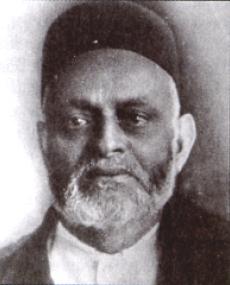
Joosub was born in Ranavav in India in 1862. He was the youngest of five children fathered by Hajee Joosub, a merchant, farmer and herbalist. Hajee Joosub treated the sick by providing free medicine, shelter and food. His generosity inspired two of his sons to build a rest house for wayfarers in his memory after his death in 1904. His wife passed away in 1905.
Joosub never had any formal education, but taught himself Arabic, Urdu and Gujarati. At the age of 14 he decided to undertake a journey to South Africa and arrived in Cape Town in 1876 after a harrowing passage per boat. He proceeded to Pretoria by ox-wagon in the company of several Dutch and African travellers. With only a few pounds in his pocket he decided to invest in a donkey to carry merchandise for his new business as a hawker. Soon Joosub was recognised in Pretoria. He learned English, Afrikaans and Xhosa in order to communicate better with his customers.
Two years after his arrival in South Africa Joosub returned to Ranavav and in 1879 married Mariam, but returned to Pretoria alone. Mariam never saw South Africa and passed away in India in1900 after which Joosub married Hoomera on a visit to India in 1902. A few months after his return to Pretoria he was offered a partnership in firm of Ismail Suliman and Company and in 1883 started his own general dealer’s.
1893 marked a turning point in Joosub’s life for two reasons. Mohandas Gandhi, who had just qualified as a lawyer in England, arrived on his doorstep. The Joosub and Gandhi families lived close to each other in India and knew each other well. Joosub became the ‘agent’ for people who wanted to contact Gandhi for help. He also converted his retail business to wholesale.
As an Indian trader Joosub had to contend with hostility from Dutch burghers, but after the founding of the Transvaal Republic in 1884 they changed their attitude. Now he was a respected merchant and his popularity increased greatly. President Paul Kruger and General Louis Botha were among his customers.
Joosub returned to India eight times between 1878 and 1930. One of his brothers, Hajee Cassim returned to South Africa with him as a business partner, but retired from business in 1914, returned to India and died in 1932. Joosub continued to expand his company and in 1914 bought two more sites, one of which became the headquarters for the M.H. Joosub firm. He was known for his generosity and compassion and aided many hawkers and traders by setting up a free kitchen and rest rooms.
In order to meet the demand for Islamic literature at the turn of the century he commissioned Sayed Abed Mia Osmany to write several books that he published free of charge. He was also instrumental in the raising of funds for the Queen Street Mosque and the Lorenz Street jamaat khana in Pretoria. Joosub also assisted in the building of the Middelburg and Krugersdorp mosques.
Joosub was a devout Muslim and his house was always open to visitors from abroad. He also made the pilgrimage to Mecca twice in 1918 and 1931.
He died suddenly, a few days after his wife, on 27 August 1944.